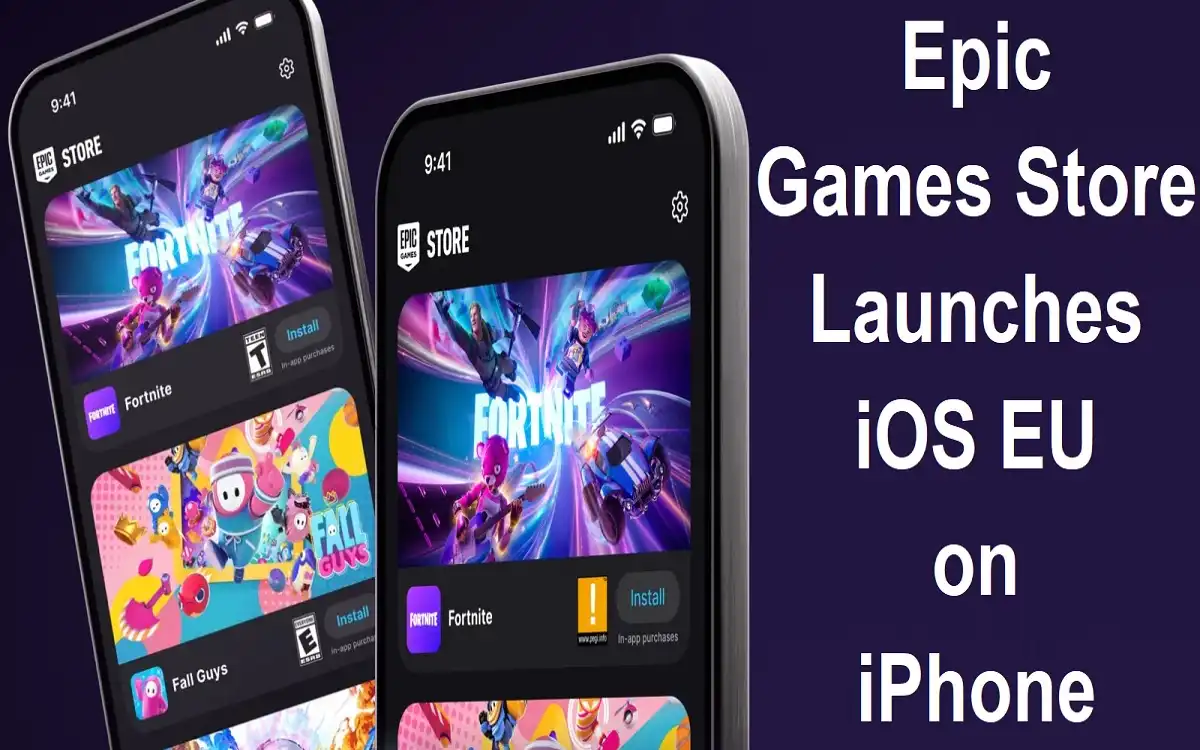Introduction
Epic Games has successfully launched its Epic Games Store on iOS devices within the European Union (EU). This monumental step, made possible by the EU’s Digital Markets Act, marks a significant shift in the iOS app ecosystem, challenging Apple’s long-standing monopoly on app distribution. The arrival of the Epic Games Store on iOS not only brings popular titles like Fortnite back to iPhone users but also paves the way for a more competitive and diverse mobile gaming landscape.
Recent Released: How To Download And Use 1Password Launches Recovery Codes on iPhone
The Digital Markets Act: Catalyst for Change
How to Understand the EU’s Digital Markets Act
The Digital Markets Act (DMA) is a landmark piece of legislation aimed at promoting fair competition in digital markets. Its primary goal is to prevent large tech companies, known as “gatekeepers,” from abusing their market power.
Impact on Apple’s App Store Monopoly
The DMA requires Apple to allow alternative app stores and sideloading on iOS devices within the EU. This regulation effectively breaks Apple’s monopoly on app distribution, opening up new possibilities for developers and consumers alike.
Epic Games’ Response to the DMA
Epic Games, a long-time advocate for open platforms, swiftly capitalized on this regulatory change by launching its Epic Games Store on iOS. This move aligns with the company’s mission to provide more choices and better deals for both developers and gamers.
The Epic Games Store on iOS: A Closer Look
Installation Process
Installing the Epic Games Store on an EU-based iPhone is a straightforward process:
Step#1.Open Safari and navigate to epic.gm/mobile-launch
Step#2.Tap “Install” and grant permission for the Epic Games Store Marketplace in Settings
Step#3.Tap “Install App” on the iOS popup
Step#4.Open the newly installed Epic Games Store app
Step#5.Browse and select games for installation
Available Games at Launch
The mobile version of the Epic Games Store debuts with a curated selection of popular titles:
- Fortnite: Making its triumphant return to iOS after a nearly four-year absence
- Fall Guys: Marking its mobile debut exclusively through the Epic Games Store
- Rocket League Sideswipe: Bringing fast-paced car soccer action to iOS users
Features and Functionality
While the initial launch focuses on mobile game distribution, the Epic Games Store on iOS is expected to develop progress. Future updates may include:
- Browsing and purchasing PC games
- Cross-platform play and progression
- Epic’s signature free game promotions
Implications for the Mobile Gaming Ecosystem
Increased Competition
The introduction of the Epic Games Store on iOS fosters a more competitive environment, potentially leading to:
- Lower commission rates for developers
- More diverse pricing models
- Improved discoverability for indie games
Benefits for Developers
Alternative app stores like Epic’s offer developers new opportunities:
- Reduced platform fees
- Direct communication with users
- Greater control over app distribution and updates
Enhanced User Experience EU-based iOS users now enjoy:
- Access to previously unavailable games
- Potential for lower prices due to competition
- More choice in how they discover and purchase apps
Challenges and Limitations
Regional Restrictions Currently
The Epic Games Store on iOS is only available within the EU. Attempts to access it from other regions, even through VPNs, have proven unsuccessful.
Limited Functionality
The initial release focuses solely on mobile game distribution, lacking features such as PC game browsing and purchasing.
Potential Security Concerns
As iOS opens up to alternative app stores, users and developers must remain vigilant about potential security risks associated with sideloading apps.
The Road Ahead: Global Implications and Future Developments
Potential Expansion to Other Regions
While currently limited to the EU, the success of the Epic Games Store on iOS could prompt similar regulatory actions in other regions, potentially leading to a global rollout.
Ongo Legal Battles
Epic Games continues to challenge Apple’s app policies in other parts of the world, including the United States, where similar changes could significantly impact the mobile app landscape.
Innovation and Competition
The introduction of alternative app stores is likely to spur innovation in app distribution, payment systems, and user experiences across the mobile ecosystem.
Conclusion
The launch of the Epic Games Store on iOS devices in the EU represents a watershed moment in the mobile gaming industry. By challenging the status quo and offering an alternative to Apple’s App, Epic Games has taken a significant step towards a more open and competitive mobile platform. While the full impact of this development remains to be seen, it’s clear that the mobile gaming landscape is evolving, promising exciting possibilities for developers, gamers, and the industry as a whole.
As Epic Games CEO Tim Sweeney aptly stated, “The tide is turning, and the mobile ecosystem is finally opening up to competition.” This sentiment encapsulates the potential for transformative change that the Epic Games St ore on iOS represents. As we move forward, it will be fascinating to observe how this development shapes the future of mobile gaming and app distribution on a global scale.
Table: Comparison of App Store Options on iOS in the EU
| Feature | Apple App Store | Epic Games Store |
| Availability | Global | EU Only |
| Commission Rate | Up to 30% | Likely lower (TBA) |
| Game Selection | Extensive | Limited (at launch) |
| In-App Purchases | Apple’s system only | Potentially flexible |
| User Base | Established | Growing |
| Security Measures | Strict app review | To be determined |
| PC Game Access | No | Potential future feature |
| Free Game Promotions | Rare | Likely (based on PC store) |
| Developer Tools | Xcode, TestFlight | Unreal Engine support |
| Payment Options | Limited | Potentially more diverse |
This table provides a useful comparison between the established Apple App Store and the newly launched Epic Games on iOS in the EU, highlighting key differences and potential advantages of each platform.


